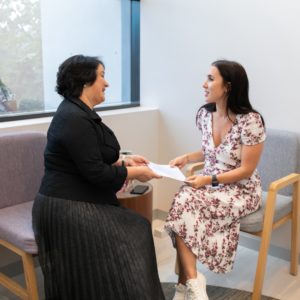Donor Eggs services are in place for women who cannot conceive using their own eggs. In most cases, the donor and recipient are known to each other. It could be a close friend or a family member who has been willing to donate her eggs.
Usually, patients come to us with a donor already in their life, however if you do not have your own donor, we have systems in place to support you through the process of advertising for an egg donor. By law, fertility specialists in Australia are not allowed to recruit egg donors. While we do have the rare woman offering to donate eggs, this is not something that happens as frequently as men offering donor sperm.
Can Donor Eggs Help You?
If you are unable to use your own eggs to conceive a baby, you may be able to use a donor egg. The circumstances may include:
- Women who are experiencing early menopause.
- Those who may be at risk of passing on a genetic disease.
- Women whose ovaries have been affected by chemotherapy or a serious illness.
- Those who have had IVF treatments and repeated cycles have shown poor egg quality.
It is important to remember that donor egg success rates are always directed related to the age of the donor and her physical heath at time of donation, as well as the number and quality of the eggs donated.
Donor Eggs – What is The Process?
Firstly, you will have a consultation with Dr Raewyn Teirney. In this consult, Dr Raewyn will talk you through all the processes surrounding Donor Eggs and will schedule you and your donor for counselling. You will also have the opportunity to discuss the legal, social, genetic and psychological aspects of being an egg donor and receiving donor eggs. This allows all parties to make a considered and informed decision that is always regarded as the right one.
The donor than undergoes the required medical checks, before undergoing an IVF cycle to have the eggs collected. This treatment is coordinated to synchronise the cycles of the recipient and donor and to allow the eggs to be collected and transferred to the recipient at the best possible time in her cycle.
At the same time, sperm is collected, and the eggs are fertilised in our laboratory. One of the resulting embryos is then transferred into the recipient approximately three to five days the collection. The remaining viable embryos are then frozen for potential transfer in the future. A pregnancy test is then conducted two weeks later.
Can I Be An Egg Donor?
Women who donate eggs should ideally be aged between 25 and 35 years. They should be free of any medical and/or genetic conditions. Donors will need to be prepared to discuss medical history, lifestyle and physical descriptions. Your identifying details are recorded and sent to the NSW Health Central Registry kept by the NSW Department of Health, once a child is born from your donated egg. These details will remain confidential until the child turns 18, at which point they can access certain information on the registry should they wish to do so.
How Much Does It Cost?
There are costs involved in the preparation of egg donors, which fall outside of the fertility treatment costs that you may already be paying. Medicare only provides rebates for fertility treatments in cases where there is a medical problem. Please refer to IVF Australia’s Costs Of Fertility Treatment page to get a better understanding of costs. It is also recommended that you discuss your individual situation at length with Dr. Raewyn at your first consult.
The Laws Around Donor Eggs
Dr. Raewyn Teirney works with IVF Australia for fertility treatment, including donor eggs. Both Dr. Raewyn and IVF Australia follow the Australian Health Ethics Committee guidelines when providing any fertility treatment. You can read more about the guidelines and laws by clicking here.



